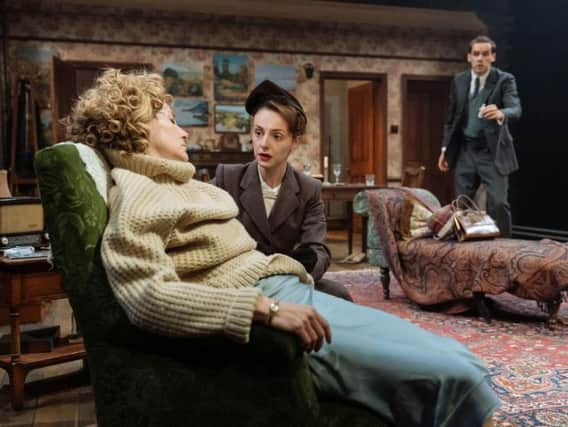REVIEW: Deep Blue Sea at The Minerva Theatre


We were there in the shabby rented sitting room when her semi-conscious body was discovered by the hissing, unlit gas fire.
We smelt the sweat and Adrenalin rush as the neighbour's cried for help and carried her to the bedroom.
Advertisement
Hide AdAdvertisement
Hide AdBut it was only as Hester Collyer (Nancy Carroll) was pulled back from the brink of death by discredited former doctor Mr Miller (Matthew Cottle) that the full horror was unveiled.
Her failed marriage to a successful London lawyer. Her wreckless and all-consuming passion for her lover. The loss of everything that once defined her in a societal context.
Her whole life is disassembled during that one September day in 1952.
And we were there to share the pain.
Thank goodness the Chichester Festival had the sense to stage this reupholstered Terence Rattigan play in the intimacy of the tiny Minerva next door to the main house so the audience could face Collyer's turmoil, eyeball to eyeball.
Advertisement
Hide AdAdvertisement
Hide AdWith her lead-crystal cut diction, Carroll extracts every desperate sigh from the part of a woman who has abandoned a life of social ease for a man whose care for her appears less substantial than that of the abandoned husband, Sir William Collyer (Gerald Kyd).
It is with enormous gentleness that Collyer begs his wife to return; to climb into the waiting Rolls-Royce and return to the swirl of dinner parties and social acceptance.
No doubt, there were members of the audience, willing her to take up the invitation. But to no avail. For this is Rattigan at his own most tormented - dealing in ciphers with homosexuality at a time that both it and attempted suicide were viewed as illegal and wicked.
So there is no going back. But is there a future too beyond the gas fire?
Advertisement
Hide AdAdvertisement
Hide AdThe theatre has been notoriously inept and miserly at creating muti-dimensional roles for female actors.
From Shakespeare onward there is a legion of parts for leading men which are a treasure trove of psychological discovery.
Outside Lady Macbeth and Ibsen's Hedda Gabler the female pickings are sparse - save for some gems like this.
So no wonder that Carroll seizes the lead role with a passion and precision which is nothing short of a triumph.
Advertisement
Hide AdAdvertisement
Hide AdIt's thankfully true that concepts which shocked so much in 1952 have been diffused of their potency. And there are times in the first half when early scenes feel sluggish and light.
There is none of the froth of Rattigan's French Without Tears nor that sweeping British principle drawn in minute detail in The Winslow Boy.
But Carroll drives the pace with practised ease to a conclusion which shimmers.
Critics are likely to love this more than audiences. With a much poorer shadow of this - Plenty - running in the main house, there is a surfeit of desperation both sides of the Festival driveway.
Advertisement
Hide AdAdvertisement
Hide AdIn an era of revolutionary politics a little more light entertainment would not go amiss.
But take nothing away from this sparkling performance. And know too, in that sitting room we lived it all with her.